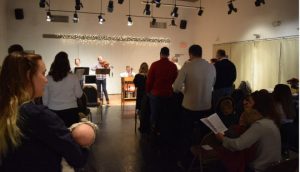Is God love? Is God king? Are the two mutually exclusive? I spent the recent Jewish High Holy Days gripped by these questions. It all started when I heard a rabbi ask children at a family service how they think of God.
The answers were generationally very different and in stark contrast to the themes and tropes of the High Holy Days. Immediately, I wanted time to ponder this question: have we lost something or are we onto something better?
The High Holy Days are also known as the Days of Awe. Only in English do we call Rosh Hashanah (the Jewish New Year) and Yom Kippur (the Day of Atonement) “high” holidays, or as I prefer holy days. In Hebrew, the terminology leaves no doubt as to the awe and reverence due on these days: they are the Yamim Nora’im (literally, awe-some or awe-full days), usually translated Days of Awe. I have always found some comfort in the annual self-accounting, contrition, and Divine judgment, especially since the rabbis show us a God who is willing to tip the scales in our favor.
The God of Judgment, a shepherd reviewing its flock, a general surveying his army, that God is a consistent part of the liturgy, both poem and prayer, we recite on these Days of Awe. That God is not the God of whom the children I heard spoke. They spoke of God as Love, as Kindness, as Everywhere, and even as In-Us.
To be sure, I believe in the God of whom they spoke. I believe fervently that we experience God through love; that we are God’s hands and feet when we do acts of kindness (and are touched by God when others are kind to us); that God’s infinitude means God can be found anywhere and is in all places at all times; and that, by extension, God is, of course, within each of us. Most of the time, I talk about the same God as those children did.
And yet...and yet, I wonder if we need more of that other God, that challenging God, that demanding God in our lives. Especially today, when it seems leadership can be defined by obstructing someone else from achieving their goals or by conducting business as usual even when the status quo has been proven to be corrupt. Especially today, when it is too easy and too common to find judgment without evidence or rational basis in the comment section of online articles and personal Facebook feeds. Especially today, when parents want so much to help their children that they forget children most need boundaries. It seems to me that a world with increasingly less examples of authority needs a counterweight.
On Rosh Hashanah, Jews crown God, the Creator of the World, as King of King of Kings. There is no monarch or ruler as high as God, the Sole Ruler. On Yom Kippur, we present ourselves as without merit, asking for compassion. Can the rituals associated with these efforts mean anything if we see ourselves as equally important, equally powerful, and accountable really only to ourselves?
The God of Love, Kindness, Everywhere, and In-Us equalizes us in powerfully good ways. We see each other as fellow creatures, as deserving of love and respect, as aspects of the divine image. We need this view to work better together, to get along. I am grateful for this God.
This year, I am grateful, too, for the God on High, enthroned in majesty that defied imagination. How fitting that the next holiday, which begins tonight, asks us to go out of our homes and to be fragile. Sukkot, the Festival of Booths or Tabernacles, forces us out of our routine, to be exposed to Nature, and perhaps to get one more view of God as power. Even better, Sukkot celebrates God’s bounty and protection even as we acknowledge our smallness. Perhaps, then in its balance of God Above and God Within, Sukkot should be our High Holy Day.
About Rabbi Jeremy Winaker
Rabbi Jeremy Winaker is the executive director of the Greater Philadelphia Hillel Network, responsible for West Chester University, Haverford, Bryn Mawr, and other area colleges. He is the former head of school at the Albert Einstein Academy in Wilmington and was the senior Jewish educator at the Kristol Hillel Center at the University of Delaware for four years. Rabbi Winaker lives in Delaware with his wife and three children.


Comments